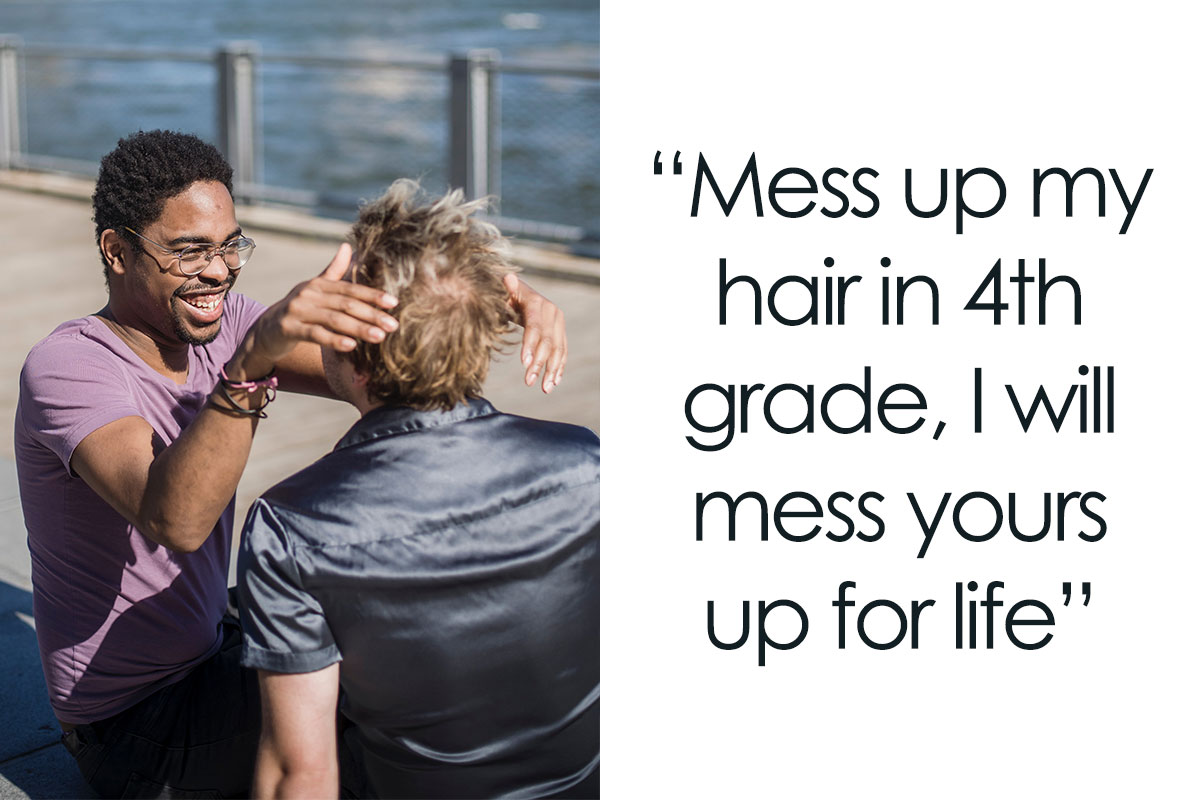
“We’re 52 Now”: Man Regrets Friday 13th Prank After 4th Grade Classmate Takes Lifelong Revenge
InterviewWho would have thought that petty revenge can feel wholesome, too? Well, redditors got to make sure of it themselves when the user ‘frenglish2’ shared his story.
Spanning over several decades, the tale started back in the 4th grade, when the redditor’s friend began something that would haunt him for years to come. Little did the friend know that the OP would go through great lengths to get back at him, consequently making him fear every Friday the 13th. Scroll down for the full story.
Bored Panda has reached out to the OP and he was kind enough to answer a few of our questions. You will find his thoughts in the text below.
Some people might seek petty revenge even decades after the wrongdoing
Image credits: cottonbro studio (not the actual photo)
This redditor has been getting petty revenge for years now for something his friend did back in 4th grade
Image credits: Ketut Subiyanto (not the actual photo)
Image credits: frenglish2
The OP said he rarely plans the ways he will mess his friend’s hair in advance
“That’s adorable,” one redditor noted in the comments under the OP’s post; “Wonderfully petty!” another one added. The community seemed to have been taken by surprise by how wholesome this case of petty revenge was, but who doesn’t love a nice friendship story? Especially one that has spanned over four decades.
“We met in kindergarten,” the OP told Bored Panda in a recent interview. “But we didn’t become friends until the 4th grade, when I decided I would be his friend and followed him around while he tried to outrun me; that is until he gave up and decided we’d be friends too. After that we hung out almost every weekend until college.”
The redditor also shared that this year no one messed with the friend’s hair. “This Friday the 13th he was out camping to see the eclipse, and I didn’t plan ahead so I couldn’t get him,” he explained. “After many dropped calls to his girlfriend, he responded with a picture of him in the desert flipping me the bird with a big smile on his face.”
The OP said that he usually has the friend’s girlfriend or a friend living nearby mess with him. “I live in Seattle and he’s in Utah so it’s a bit of an effort. Especially since I never plan ahead… I think it would be cheating to plan for it,” he said, adding that old friends are very important, as they not only know who you are, but also know who you used to be.
Friendships can make life better on numerous levels
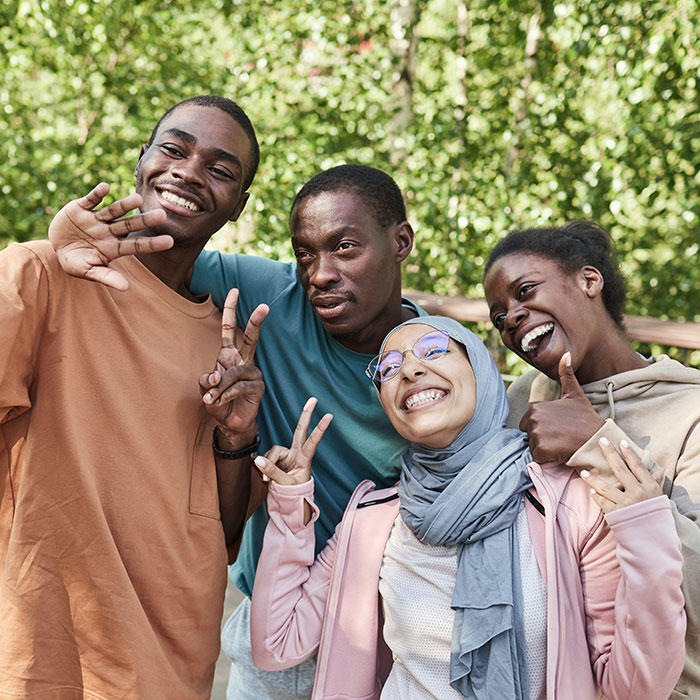
Image credits: Edmond Dantès (not the actual photo)
Reading about such friendships alone can be heartwarming, so it’s no surprise that being part of one feels infinitely better and boasts numerous benefits. It’s clear even without research—even though the importance of maintaining friendships has been analyzed—that friends provide much-needed support and companionship, which is linked to better mental well-being, happiness and lower levels of loneliness.
The American Psychology Association (APA) seconded the idea that platonic friendships have numerous benefits for our mental health; research suggests they can even help prevent issues such as depression and anxiety. In addition to that, they can positively affect the way we handle stress, as blood pressure reactivity reportedly differs depending on whether we talk to a friend and someone we don’t know that well, for instance.
APA also pointed out that having a close platonic relationship can affect the way our brain works; research found that friends experience similar brain activity in regions related to motivation, reward, identity, and sensory processing.
“The big surprise here is that the similarities are all over the brain, including regions that control how we direct our attention, how we think about things, and even what we’re looking at,” Professor in the Department of Psychological and Brain Sciences at Dartmouth College, Thalia Wheatley, told the American Psychology Association.
Not all friends are equally close, which often depends on the amount of time spent together

Image credits: Savannah Dematteo (not the actual photo)
In the piece for the American Psychology Association, another expert, a professor of psychology at McGill University in Montreal, Melanie Dirks, pointed out that platonic friendships are the very first relationships in our lives that we choose freely. That’s why they play a significant role in the way we handle relationships later in life and navigate challenging interpersonal situations.
But how long does it take for a relationship to become a friendship, you wonder? The question might be too subjective to answer; however, some people tried putting a timestamp to it. The New York Times reports that, according to an expert in the psychology of friendship, Jeffrey Hall, it takes roughly 45 hours spent in the presence of each other’s company for acquaintances to become friends.
According to Hall, the transformation from a casual friend to a meaningful one calls for 50 more hours spent over the course of three months, and taking it to an even higher level—becoming part of one’s circle of close friends—demands another 100. The NY Times also emphasized that people tend to dedicate way more of their time to the circle of their close friends rather than people they barely know.
According to the evolutionary psychologist Robin Dunbar, they allocate roughly 8.5 hours a month to five of their closest friends, and just over 2 hours for each of the next 10 people on their list. Dunbar suggests that these 15 people comprise the circle of one’s closest friends that is part of a larger group of 150 people, which the expert believes is the maximum number of stable relationships a person can maintain at a given moment.
Modern technology can help maintain friendships

Image credits: EKATERINA BOLOVTSOVA (not the actual photo)
Nowadays, with the help of modern technology, people can maintain friendships more easily, even if they’re miles away. That allows them to stay in touch after moving or switching schools, for instance, or even enables them to engage in interstate petty revenge, as the OP’s story shows.
Staying in touch with friends with the help of technology seems to be especially widespread among members of the younger generation. The Pew Research Center found that as much as 55% of teens nowadays spend time with their closest friend online on a regular basis.
No matter the age, friendships are important and beneficial to most people, which is why it’s important to work on maintaining them, with or without the use of modern technology. (Consider this your cue to catch up with a close friend.) And whether it means paying them a weekly visit or waiting for Friday the 13th to make some sort of an appearance in their lives, both instances are likely to positively impact those involved.
Fellow redditors shared their thoughts in the comments, the OP seemingly melted quite a few of their hearts
I love silly traditions. I like to leave notes for 1 of my friends so he can find them. Or randomly say LLOYD cause of a dumb inside joke with my friends. How about you guys?
Is anyone able to explain “la machine”? Is it from a movie? I suspect this might be a little funnier if I knew the origin of the phrase. Thanks!
"I'm gonna mess up your HAIR, Pretty boy!!" (the stand- original TV movie...popped in my head lol)
I love silly traditions. I like to leave notes for 1 of my friends so he can find them. Or randomly say LLOYD cause of a dumb inside joke with my friends. How about you guys?
Is anyone able to explain “la machine”? Is it from a movie? I suspect this might be a little funnier if I knew the origin of the phrase. Thanks!
"I'm gonna mess up your HAIR, Pretty boy!!" (the stand- original TV movie...popped in my head lol)

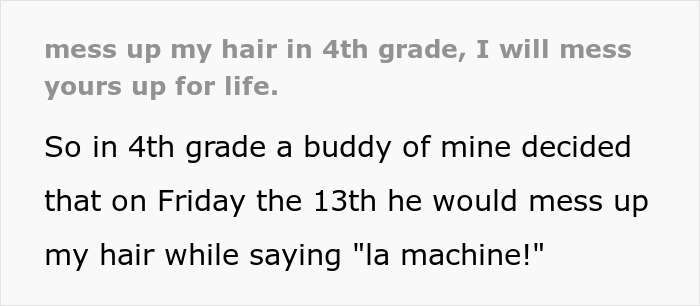
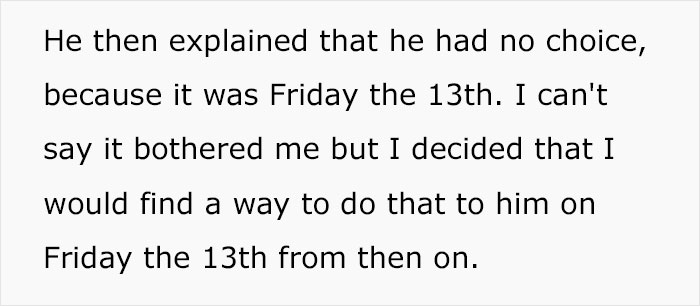

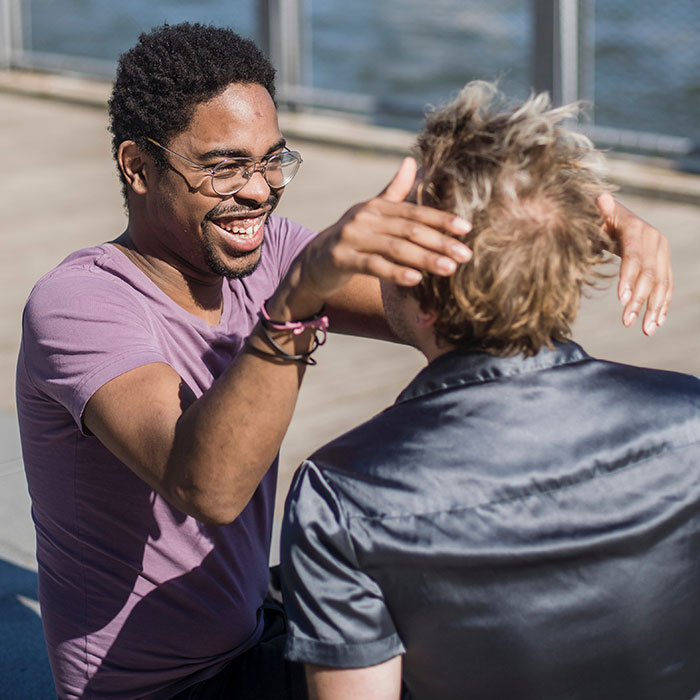


















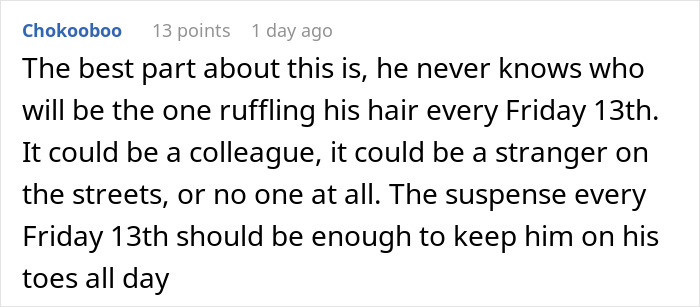

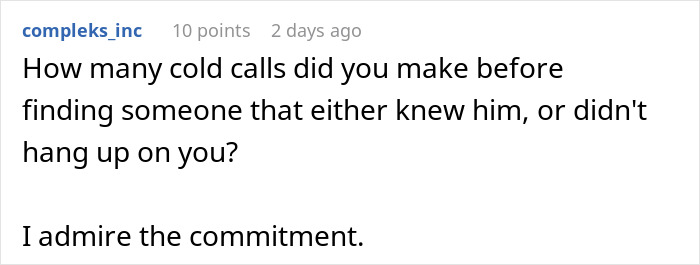





48
4